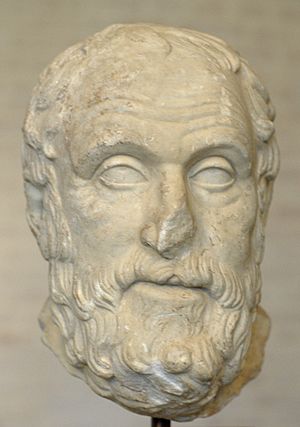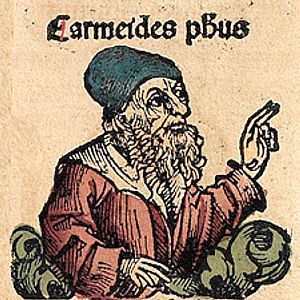Carneades facts for kids
Quick facts for kids
Carneades
|
|
|---|---|

Carneades, Roman copy after the sit statue exhibited on the agora of Athens, c. 150 BC, Glyptothek
|
|
| Born | 214/213 BC |
| Died | 129/128 BC |
| Era | Hellenistic philosophy |
| Region | Western philosophy |
| School | Academic skepticism, Platonism |
|
Main interests
|
Epistemology, ethics |
|
Notable ideas
|
Philosophical skepticism, probabilism, Plank of Carneades |
|
Influences
|
|
|
Influenced
|
|
Carneades (/kɑːrˈniːədiːz/; Greek: Καρνεάδης, Karneadēs, "of Carnea"; 214/3–129/8 BC) was an important Greek philosopher. He was a leading figure of the Skeptical Academy in ancient Greece. Carneades was born in Cyrene.
Around 159 BC, he began to challenge many old philosophical ideas. He especially questioned the teachings of the Stoics and the Epicureans. As the scholarch (leader) of the Academy, he was chosen for a special trip. In 155 BC, he went to Rome with two other philosophers. There, his talks about how we can't be completely sure about justice caused a stir among Roman leaders. Carneades didn't write any books himself. Most of what we know about his ideas comes from his student, Clitomachus. He believed that neither our senses nor our reason could fully find the truth. However, he thought we could still find what was most likely true. This helped people make decisions and act in the world.
Contents
Who Was Carneades?
Carneades was born in Cyrene, North Africa, in 214 or 213 BC. His father was Epicomus or Philokomus. He moved to Athens when he was young. There, he studied with the Stoics, learning about their logic from Diogenes of Babylon. He also read the works of another Stoic philosopher, Chrysippus.
Becoming a Leader
Carneades later focused on arguing against the Stoics' ideas. He joined the Platonic Academy, which had been criticized by the Stoics. After the death of the Academy's leader, Hegesinus of Pergamon, Carneades was chosen to be the new scholarch (head). He was a very skilled speaker and debater. His abilities brought new fame to the Academic Skeptics. He never claimed anything was absolutely true, not even that nothing could be known for sure. Instead, he strongly argued against any fixed ideas or dogma held by other groups.
His Trip to Rome
In 155 BC, when Carneades was 58 years old, he went to Rome. He was an ambassador, along with the Stoic Diogenes of Babylon and the Peripatetic philosopher Critolaus. Their mission was to ask Rome to reduce a large fine placed on the Athenians. This fine was for destroying a place called Oropus.
While in Rome, Carneades became famous for his powerful speeches on philosophy. He gave talks about justice in front of important Romans, including Cato the Elder. In his first speech, he praised the virtue of Roman justice. The very next day, he gave a second speech. In this talk, he argued against everything he had said the day before!
He tried to show that justice is always complicated. He said it's not a natural virtue, but rather a useful agreement. This agreement helps keep society organized. Cato was shocked by this. He saw that Carneades' ideas could make Roman youth question their beliefs. So, Cato convinced the Roman Senate to send Carneades back to Athens. This was to stop young Romans from hearing more of his challenging ideas. Carneades lived for 27 more years in Athens after this trip. He died in 129 or 128 BC, at the age of 85.
What Did Carneades Believe?
Carneades is known as an Academic Skeptic. Academic Skeptics were philosophers who taught at Plato's Academy in Athens. They believed that it's impossible to have complete knowledge about anything. The only thing they were sure of was that all other knowledge is impossible.
No Writings, Just Ideas
Carneades didn't write any books. Everything we know about his teachings comes from his close friend and student, Clitomachus. But Carneades was so true to his own ideas about not being certain of anything, that even Clitomachus admitted he never truly knew what his teacher thought on any topic.
In ethics, which he studied deeply, Carneades seemed to disagree that moral ideas naturally fit with nature. He emphasized this in his second speech on Justice. He argued that ideas of justice don't come from nature. Instead, they are simply made up by people for practical reasons and convenience.
Why We Can't Know Everything
All of Carneades' ideas came from his main belief: people don't have, and can never have, a perfect way to test what is true. He argued that if there were a way to find truth, it would have to come from reason (logos), or our senses (aisthêsis), or our thoughts (phantasia).
But he pointed out that reason depends on our thoughts, and our thoughts depend on our senses. We have no way to know if our senses are truly showing us things as they are. They might give us wrong impressions, leading to false thoughts and making our reason also wrong. So, Carneades concluded that senses, thoughts, and reason cannot be perfect ways to find truth.
Living with Uncertainty
Even though he believed we can't know anything for sure, Carneades understood that people still need to live and make choices. So, he suggested that even if we can't say something is absolutely true, we can still find things that are probably true.
He said that some sensations or ideas seem more true than others. We should be guided by what seems most convincing. Also, our senses often work together. Many sensations can either support or contradict each other. The more ideas and sensations combine to confirm something, the more likely it is to be true. For Carneades, the highest probability, or the closest we could get to truth, was when many ideas, each seeming very true, all combined to confirm something that also seemed very true.
See also
 In Spanish: Carnéades para niños
In Spanish: Carnéades para niños
- Academica (Cicero)
- Anti-realism
- Moral relativism
- Philosophical skepticism
- Pyrrhonism
- Subjectivism
Sources
 This article incorporates text from a publication now in the public domain: Grenfell, Algernon (1870). "Carneades". Dictionary of Greek and Roman Biography and Mythology 1.
This article incorporates text from a publication now in the public domain: Grenfell, Algernon (1870). "Carneades". Dictionary of Greek and Roman Biography and Mythology 1.


